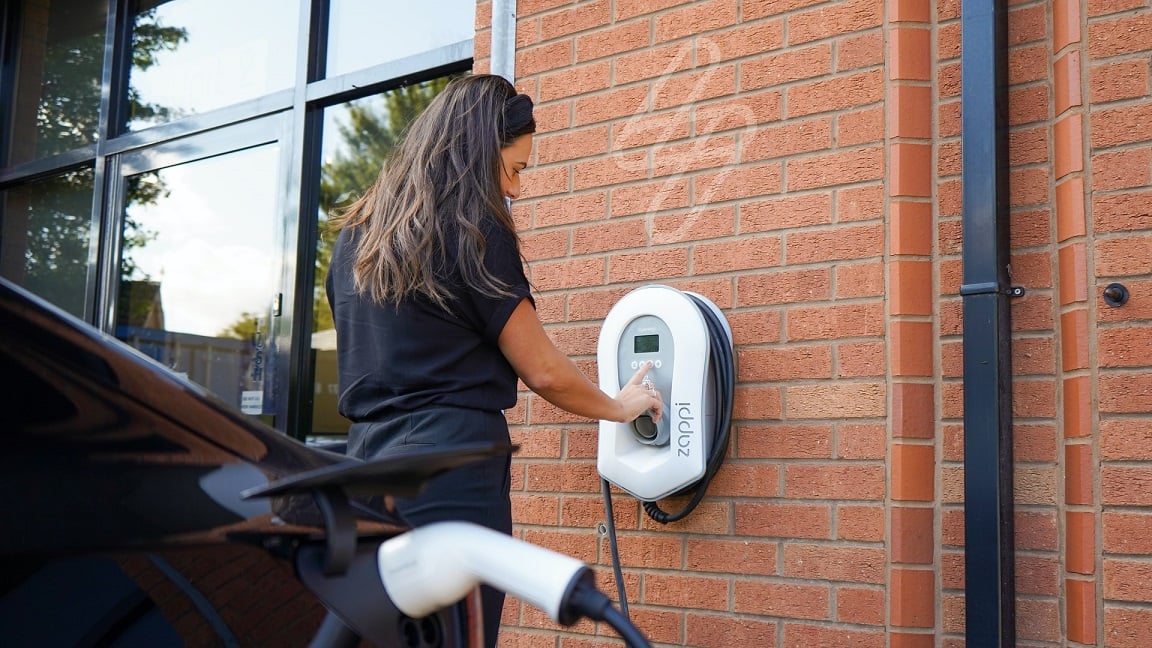
If you’ve bought or leased an electric car, it pays to charge at home (as long as you’re lucky enough to have off-street parking). Unit prices of electricity are likely to be cheaper at home than at public charging stations, with many suppliers offering EV tariffs with even cheaper overnight rates to encourage you to top up outside of peak hours.
It’s best to avoid charging from a normal three pin socket, as this is both incredibly slow and a safety hazard. So here is a breakdown of electric car charging points costs and grants to have your own charger installed at home or work.
The average cost for a domestic EV chargepoint is £1,350, including VAT and excluding the OZEV grant.
The average cost for a commercial EV chargepoint is £1,000-£1,500 + VAT, excluding the WCS grant.
These costs include the physical charging unit and the installation by a qualified electrician. It would not be safe to install an EV charger yourself and so this must always be done by a professional who has the necessary training and qualifications.
Of course, some of the installation cost could be recuperated by billing visitors who use your commercial chargepoints, or even renting out your home charger.
The cost to install a charger can vary depending on a number of factors, including:
Here are some example costs for popular models we install:
|
Model |
Average cost (inc. VAT and grant) |
|
zappi |
£1,395 |
|
Andersen A2 |
£2,000 |
There are currently government grants running from the Office for Zero Emission Vehicles (OZEV) to assist with installation costs.
For businesses, there is the Workplace Charging Scheme (WCS). This covers 75% of the cost of installation up to £350 per chargepoint. There is a limit of 40 chargepoints per business, making the grant worth up to £14,000. The grant is designed for off-street commercial parking for use by staff (not the public) and chargers must be fitted by an OZEV-approved installer.
For certain homeowners (those living in flats or rental accommodation), there is the Electric Vehicle Homecharge Scheme (commonly referred to as the OZEV grant). This offers a 75% contribution to the cost of installing a single EV chargepoint at a domestic property, up to £350. To qualify, you need to have off-street parking, an eligible vehicle, and be getting a smart chargepoint installed by an OZEV-approved installer.
The good news is that it is vastly cheaper to top up an EV than an equivalent petrol or diesel car.
To illustrate this, let's consider the Nissan LEAF with 36kWh of usable battery capacity (equivalent to about 135 miles of range).
| Charging option | Example cost per kWh | Cost for full recharge | Approx. cost per mile |
| Overnight EV tariff | 5p | £1.80 | 1p |
| Flat rate domestic tariff | 22.36p | £8.05 | 6p |
| Motorway service station | 39p | £14.04 | 10p |
By comparison, let's look at the VW Golf 8 petrol car with an 50l (11 gallon) fuel tank and 60mpg fuel consumption (therefore having 660 miles of range).
If the petrol cost is 167p/litre, a full top up would be £83.50. This gives an approx. cost per mile of 13p. Clearly, charging an EV has the potential to be a lot cheaper than filling up a petrol car!
Please note that we only install EV charging points alongside new solar PV systems, within our service area.
Spirit Energy is OZEV approved for the installation of EV chargepoints, so our clients can claim the relevant grants. We install our chargepoints according to the IET code of practise and never cut corners. Our installations are usually limited to 10m cable runs, surface mounted cabling and no groundworks. Earthing arrangements must also meet current regulations.
Copyright © Spirit Energy 2026 · info@spiritenergy.co.uk · 0118 951 4490
Jobs and Careers
Interested in joining the Spirit team? Email jobs@spiritenergy.co.uk
Spirit House, 25 Albury Close, Reading, RG30 1BD
(Location formerly known as 44 Portman Road, Reading, RG30 1EA)
Spirit Energy is the trading name of Spirit Solar Ltd · UK Company Number 07138647
Although care is taken to ensure that the information on our website (www.spiritenergy.co.uk) and any guides, calculators or checklists provided by us, electronically or otherwise, are accurate and up-to-date, we cannot accept any responsibility for mistakes or omissions. We enter into no express or implied conditions, warranties, terms or representations regarding the quality, accuracy or completeness of the information. We exclude to the extent lawfully permitted all liability for loss or damage, whether direct, indirect or consequential arising out of your use of our website or any guides, calculators or checklists provided by us, or from any information or omission contained in our website or any guides, calculators or checklists provided by us.